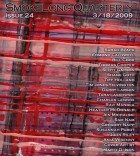What can you tell us about this couple? Who are they? What led you to these characters?
They’re not a couple, per se. Not in a static sense. The relationship is temporary, like all relationships. He’s facing middle age, but isn’t there yet. Mid- to late thirties. She’s a bit younger, by maybe a decade. They’re navigating whatever their lives are and bump into one another.
I started with a guy lost in a surreal underground-parking-garage kind of maze who keeps meeting different people, some dangerous and some lovely, but I ended up sloughing all that and trying to tell one particular meeting. I dumped the maze idea and left them in one spot, a mall floor, because it somehow made the story work better, and it led to the idea for the story’s repetitive-additive structure, which I’ve seen used to good effect by other writers (a story by Tao Lin comes to mind—can’t find it at the moment).
Once the structure fell into place, I just made stuff up as I went along. For example, at one point I needed something to happen, so I had them talk. That meant I needed something for them to say, and since I also thought the woman needed a bit of a past, I had her bring up childhood. Addressing what had been in my view a requirement of the story’s structure, I inadvertently (and happily) made her character more interesting.
One line sticks out to me over and over. When they are talking about their childhood, she says “I was like this, but for a long time I’ve been different.” What is she saying to him? Or us?
She’s admitting that her personality is manufactured to meet the demands of living, like a costume. Occasionally there are people with which we can, for a time, be ourselves to a greater extent than usual—take off the costume. She’s stating her recognition that this is one of those times. More briefly, she’s saying, “Ah, this is nice.”
Your childhood? What was it like? And, how has it affected your writing?
It was a childhood—what can I say? Somebody probably already observed that we spend our adulthood processing our childhood. I think I’ve heard something like that, in some form, and that’s interesting—like childhood is a really big meal we have to digest.
Flash fiction doesn’t have the luxury of including broad sweeping backstory. There are many details left out of a short piece such as this. You write as if you trust the reader to ‘get it.’ What kind of a challenge is that for you—keeping a balance between over-telling and under-describing?
It’s one of the fun parts. It’s a learned skill, one that I hope to improve. There’s a lot that goes into it. Trusting the reader, yes. Trusting myself. Trying at all times to realize what’s important. For example, the preceding sentence almost ended with, “and what’s not,” but we didn’t [really] need that [did we?]. Unnecessary and uninteresting. That’s at line-level. Same applies scene-level, character-level, etc., but it’s easy to get carried away. When a story of mine succeeds, which happens only occasionally, what I think keeps me from being too lean, or under-describing, is my own immersion in the physical and emotional aspects of the story—when the prose is cut to the right size, that stuff remains in the weave. People have already said all this before, though—Hemingway’s version had icebergs—but I have to figure it out again every time I try a story. Fun, sometimes.
Who is Gregory Napp?
Early to mid-thirties. Teaches English at Kyung Hee University in Seoul. Married nine years. One daughter.


 The core workshop of SmokeLong Fitness is all in writing, so you can take part from anywhere at anytime. We are excited about creating a supportive, consistent and structured environment for flash writers to work on their craft in a community. We are thrilled and proud to say that our workshop participants have won, placed, or been listed in every major flash competition. Community works.
The core workshop of SmokeLong Fitness is all in writing, so you can take part from anywhere at anytime. We are excited about creating a supportive, consistent and structured environment for flash writers to work on their craft in a community. We are thrilled and proud to say that our workshop participants have won, placed, or been listed in every major flash competition. Community works.